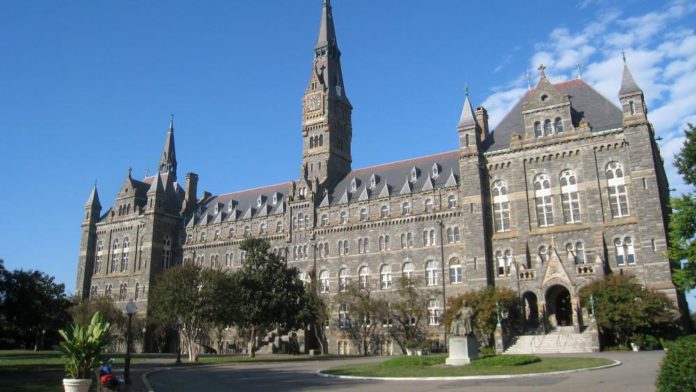![]()
The current Editorial Board of The Georgetown Review (presiding since October 27, 2019) supports full access to past articles published under different Editorial Boards, but does not necessarily endorse their content.
As reported in the Hoya, the Voice, and media across the nation, students enrolled at Georgetown at this very moment may be responsible for the embarrassing and shameful spectacle casting a shadow on our university.
If the allegations of bribery, cheating, and other fraudulent activities facing the students and their parents are proven to be true, the implicated students should face Honor Code violations and be expelled or, if graduated, have their degrees revoked.
The Honor Code of the university is clear: all pledge to “be honest in every academic endeavor, and to conduct myself honorably, as a responsible member of the Georgetown community.”
Furthermore, explicitly prohibited conduct includes cheating on exams and falsifying academic documentation, such as transcripts or letters of recommendation. The students in question, if allegations are true, have fallen far afoul of this standard, creating “sufficient gravity” for a full Honor Council investigation and grounds for receiving the most serious punishment described: expulsion.
According to the affidavit released to support the criminal complaint, both publicly identifiable implicated students currently at Georgetown knowingly lied to the university, falsified their credentials, and in one case, flagrantly cheated on her SAT exam through the help of Key Worldwide Foundation (KWF).
The affidavit details, and the Daily Beast writes scathingly, how Isabelle Henriquez, COL ‘20, sat side by side with her proctor and was fed answers during her SAT exam.
To get this treatment, her family is said to have paid $25,000 and round trip airfare from Florida to California for a proctor. Later, the proctor allegedly “‘gloated’ with [Isabelle and her mother] about the fact that they had cheated and gotten away with it.”
Henriquez also allegedly lied to Georgetown and participated in the bribery of the now disgraced former tennis coach Gordon “Gordie” Ernst to receive unwarranted designation as a tennis recruit.
As part of the scheme, the affidavit shows that she wrote to Ernst saying, “I have been really successful this summer playing tennis around the country.” Furthermore, she told Georgetown that she spent 20 hours a week playing club tennis and was ranked in the top 50 of the US Tennis Association. According to the affidavit, however, there is little evidence that she played tennis past middle school, when she had a losing record of 2-8 and was ranked 207th in Northern California in the girls 12 and under division. In May of 2016, after securing Henriquez’s acceptance to Georgetown, the Henriquez Family Trust made a donation of $400,000 to KWF.
The case of the Semprevivo boy, COL ‘20, follows a similar pattern. In August of 2015, Semprevivo wrote to Ernst in hazy language that “After your suggestion I have played very well with terrific success in Doubles [sic] this summer and played quite well in singles too.” According to Semprevivo, “Our conversations have inspired me to try to dominate my competition this summer.” In his college essay, he wrote that “When I walk into a room, people will normally look up and make a comment about my height – I’m 6’5 – and ask me if I play basketball. With a smile, I nod my head, but also insist that the sport I put my most energy into is tennis.”
Semprevivo even claimed in his application to be ranked in singles tennis, apparently having played tennis throughout high school. He further wrote to Georgetown that he was an “Academic All American” in tennis as well as a member of the “Nike Federation All Academic Athletic Team” for tennis. According to the affidavit, however, these claims are entirely false, Semprevivo not having played tennis in high school nor there being any record from the USTA of any matches he ever played in. Semprevivo was nevertheless admitted to Georgetown, and in April of 2016 KWF received $400,000 from the Semprevivo Family Trust.
It is disturbing that these students were allegedly able to lie and bribe their way into Georgetown, and that they reportedly did so knowingly and actively should be grounds for dismissal. The repeated and bald-faced lies are ugly and almost absurd in their perfunctory execution. They are nonetheless serious instances of fraud, and they demonstrate an utter lack of judgement and concern for consequences.
But disturbing also is the negligence of the Georgetown Admissions Office. Both students made wild and easily verifiable claims about their tennis prowess and accomplishments. Both claimed to be ranked, but a simple inquiry would prove those rankings are fiction. Both wrote vague details to Ernst that, once sent along to Admissions, did not receive a second glance although they certainly did not pass muster. Both never played for the Georgetown Tennis team, although they were recruited to do so. That apparently no effort at all was expended to verify these claims is the story that should shock the student body.
The university has declared to have adopted a new policy, one that promises “periodic audits” of recruited students and which bans coaches from modifying applications. But there is no mention of discipline or dismissals of the staff that failed to catch these egregious falsifications, nor is there any procedure to increase the transparency of the recruitment process. Questions remain of who knew what and when, and whether any steps were taken to alert authorities and other schools about Ernst’s crimes.
The past days have meant that Georgetown, along with other schools, has had to face the reality of the influence wealth and power have over it. Now, the only course of action left is to bring justice to the students who participated in the fraud and to the employees who negligently allowed it to occur.












